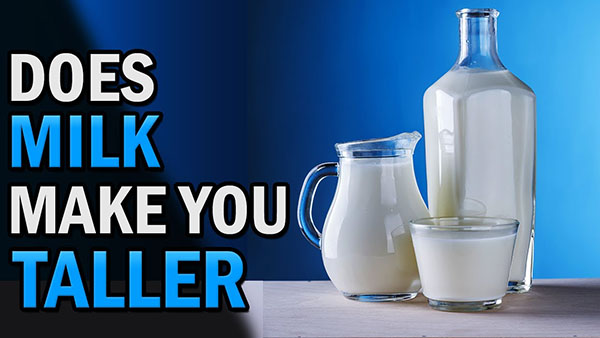
In a world where stature has long been linked to notions of success and allure, the age-old prescription of drinking milk for increased height and vigor has been a constant refrain. Since our earliest days, we’ve been taught that milk holds the secret to achieving that coveted tall presence. Yet, as we delve deeper into this topic, a veil of uncertainty begins to shroud this cherished belief.
Recent years have brought forth mounting concerns regarding milk consumption, particularly cow’s milk. Despite its touted benefits, doubts have arisen regarding the potential health risks associated with excessive intake. The use of antibiotics and hormones in dairy farming has sparked alarm, leading us to ponder the long-term effects of these substances on our health. Moreover, the rising incidence of dairy allergies in children has further complicated this ongoing discourse.
In an age marked by a deluge of contradictory information, the need to discern truth from fiction becomes increasingly crucial. It is now imperative to embark on a journey aimed at unraveling the truth behind the age-old notion that milk can enhance our stature. Join us as we navigate through this intricate maze of knowledge, seeking clarity and understanding that will enable us to make well-informed decisions for ourselves and our loved ones. Prepare to challenge your assumptions, for as we forge ahead, the enlightenment awaiting us will illuminate this intriguing inquiry. Let us collectively delve into this captivating subject, as the answers await just beyond the horizon
Can milk contribute to an increase in height?
The notion of consuming milk for height enhancement is rooted in a fundamental understanding.
It is common knowledge that our maximum height is determined by the genetic inheritance we receive, and it cannot be altered by simply drinking a glass of protein shake before bedtime with the aim of becoming taller. In other words, one cannot manipulate their genetics in this manner. However, inadequate nutrition during childhood may impact the potential maximum height and the rate of a child’s growth. Therefore, it is essential to incorporate growth-promoting foods and beverages into every child’s diet.
When it comes to the idea of drinking milk for height increase, there exists a plethora of mixed discussions, but most evidence suggests that milk does not significantly contribute to height gain. The reality is that drinking milk during childhood can aid in the development of robust bones. Nevertheless, as one enters puberty, milk plays a relatively minor role in height augmentation and growth.

How does milk help you grow?
Milk is very nutritious. It has 13 necessary nutrients, and all contribute to a healthy body. Let’s take a glance at the vital nutrients in a cup of whole milk and reduced-fat milk against the suggested daily intake for teenagers and young adults.
| Nutrient | Food Source | Amount in a cup | Suggested Daily Intake |
| Calcium | Whole milk | 276 mg | 1,300 mg |
| Reduced-fat milk | 293 mg | 1,300 mg | |
| Vitamin A | Whole milk | 112 RAE | 600-900 mcg RAE |
| Reduced-fat milk | 134 RAE | 600-900 mcg RAE | |
| Vitamin D | Whole milk | 5 IU | 600 IU |
| Reduced-fat milk | 120 IU | 600 IU | |
| Protein | Whole milk | 7.69 g | 0.5 g per pound |
| Reduced-fat milk | 8.05 g | 0.5 g per pound |
While milk alone cannot override the influence of genetic and environmental factors on your height, it can play a significant role in mitigating the effects of childhood malnutrition by providing a wide array of essential nutrients. Vitamin A contributes to bone growth, while vitamin D helps maintain bone strength. Additionally, milk contains a protein known as insulin-like growth factor 1 (IGF-1), naturally produced by the body, which stimulates cell growth and is used to address height growth issues in children.
It’s worth noting that these vital nutrients can also be found in foods other than milk. However, milk stands out as a convenient and affordable source of these growth-boosting nutrients. Therefore, it is highly recommended to incorporate milk as a regular part of a healthy diet for growing children.
As for the ideal timing for milk consumption to promote height growth:
If you are an adult and have already completed your growth phase, drinking milk will not have any impact on your height. This is because your growth plates have sealed, and your bones have reached their maximum length, typically occurring between the ages of 18 and 25, marking the end of further growth. However, if you are a child, young teenager, or in your early twenties, including milk in your diet can make a noticeable difference.
Height is primarily determined by skeletal or bone growth. Therefore, a daily intake of milk is suggested to potentially enhance mineral bone density, support bone formation, and prevent the loss of bone mass during the crucial growth years.
What type of milk is best for growing taller?
Cow’s milk is by far one of the best milk when it comes to drinking milk for height growth. On average, children who drank about 8 ounces of non-cow’s milk daily tend to be 0.2 inches shorter than those who drank the same amount of cow’s milk. Also, 3-year-olds who drank cow’s milk were about half an inch taller than those who drank alternative milk [1].
Another popular alternative to cow’s milk is goat’s milk. It includes high amounts of vitamin A to strengthen bones and muscles. Also, it contains vitamin D, which is necessary for the body to absorb calcium. Importantly, it comes with 20% more protein than cow’s milk.
Is there anything else?
Plant-based milk replacements have become trendy, and they are high in protein and nutrients as well. Since they are not derived from animal sources, they will not cause any issues related to milk allergy or lactose intolerance. For instance, you can drink oat milk because it offers the same nutrients as regular cow’s milk. And if you digest it well enough, it might improve your height over time.

What are the numerous health advantages associated with the consumption of milk?
Milk offers a plethora of health benefits, extending far beyond its well-known role in supporting bone health, as mentioned earlier.
Radiant Skin:
Within milk, lactic acid plays a crucial role in promoting smooth and glowing skin. Additionally, milk contains amino acids that enhance skin moisturization and antioxidants that combat damage caused by environmental toxins. Interestingly, if drinking milk isn’t your preference, you can incorporate it into homemade facial masks by combining it with other ingredients to achieve radiant skin.
Weight Management:
Incorporating 2-3 cups of low-fat or skim milk into your daily diet can assist in weight control and obesity prevention more effectively than those who exclude milk from their diet. It serves as a healthy post-workout snack, with some young adults reporting increased muscle mass and reduced body fat compared to individuals consuming alternative beverages with equivalent energy and macronutrient content.
Dental Health:
Milk not only provides calcium and phosphorus but also contains proteins known as caseins. When combined, these components create a protective layer on enamel that safeguards teeth from decay and cavities. To maximize calcium absorption from milk, it’s essential to ensure an adequate intake of vitamin D.
Disease Prevention:
Daily milk consumption contributes to lowering high blood pressure and reducing the risk of strokes. Furthermore, milk has the potential to reduce cholesterol production in the liver and enhance eyesight. It may even reduce the risk of developing specific forms of cancer.
In summary, the benefits of milk extend beyond mere bone health, encompassing advantages for skin, weight management, dental health, and disease prevention. Incorporating milk into your daily diet can promote overall well-being and enhance various aspects of your health
In conclusion
Consuming milk alone cannot guarantee an increase in height. It’s important to remember that genetics plays a crucial role in determining your height, and achieving optimal height growth requires a combination of factors, including proper nutrition, a healthy lifestyle, sufficient sleep, and regular exercise. While milk is a beneficial part of your diet as it provides essential nutrients, it is just one component of the overall equation for reaching your maximum height potential.
- Related post: What Is The Average Height For Women?
Valerie Aubree: A Health Expert Leading the Way at Supplementchoices.com
Valerie Aubree is a highly skilled health professional with years of experience in the industry. Currently serving as the administrator of Supplementchoices.com, she has been instrumental in providing quality health-related content to the masses. In addition to her professional expertise, Valerie is also an avid music lover, movie enthusiast, and a passionate advocate of community health activities.
Valerie Aubree’s Experience and Expertise in Health
Valerie Aubree’s impressive credentials and experience in the health industry make her a respected authority in the field. She has spent countless hours researching, studying, and staying up-to-date on the latest trends and developments in health and wellness. Her passion for health education has led her to create valuable content that has benefited millions of people around the world.
As an administrator at Supplementchoices.com, Valerie Aubree has played an integral role in providing accurate and reliable information about dietary supplements, vitamins, and other health products. Her expertise in the field has allowed her to identify the best supplements for various health conditions, and she has been instrumental in reviewing and recommending products to her readers.
Valerie Aubree’s Love for Music and Movies
Valerie Aubree is not just an accomplished health professional but also a well-rounded individual with a love for music and movies. She finds solace in listening to different genres of music, from classical to contemporary, and has an eclectic taste in movies, ranging from indie films to blockbusters. Her passion for music and movies provides her with an escape from the rigors of the health industry, and she believes that it is important to have hobbies that bring joy and relaxation.
Valerie Aubree’s Community Health Advocacy
Valerie Aubree is a firm believer in the power of community health activities. She is a passionate advocate of programs that promote health and wellness within local communities. She has participated in various community health events, including health fairs and wellness programs, and has worked tirelessly to raise awareness about the importance of healthy living.
In conclusion, Valerie Aubree is a health expert who has made a significant impact in the industry. Her experience, expertise, and passion for health education have helped millions of people live healthier and more fulfilling lives. Her love for music, movies, and community health activities make her a well-rounded individual who is committed to making a difference in the world.







I recently stumbled upon this super website, an oasis for fans. The owner has a real knack for producing compelling content that hits the mark every time. I’m thrilled to have found this site and can’t get enough of what they deliver.
I enjoyed it just as much as you will be able to accomplish here. You should be apprehensive about providing the following, but the sketch is lovely and the writing is stylish; yet, you should definitely return back as you will be doing this walk so frequently.